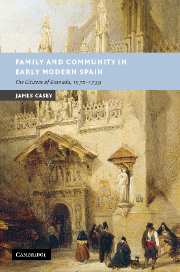Book contents
- Frontmatter
- Contents
- List of maps and tables
- Acknowledgements
- List of abbreviations
- Map 1 The Kingdom of Granada. Based on Manuel de Terán Geografia regional de España (Barcelona 1968)
- Map 2a The City of Granada (NW). Drawn by the architect Ambrosio de Vico (1596)
- Map 2b The City of Granada (SE). Drawn by the architect Ambrosio de Vico (1596)
- Introduction
- 1 Knights and citizens
- 2 Nobles of the doubloon
- 3 Lords of Granada
- 4 The web of inheritance
- 5 The network of marriage
- 6 Blood wedding
- 7 Cradle of the citizen
- 8 The shadow of the ancestors
- 9 The spirit of the clan
- 10 The law of honour
- 11 Good Commonwealth men
- 12 Defenders of the Fatherland
- 13 Conclusion
- Genealogical tables
- Bibliography
- Index
- NEW STUDIES IN EUROPEAN HISTORY
7 - Cradle of the citizen
Published online by Cambridge University Press: 06 August 2009
- Frontmatter
- Contents
- List of maps and tables
- Acknowledgements
- List of abbreviations
- Map 1 The Kingdom of Granada. Based on Manuel de Terán Geografia regional de España (Barcelona 1968)
- Map 2a The City of Granada (NW). Drawn by the architect Ambrosio de Vico (1596)
- Map 2b The City of Granada (SE). Drawn by the architect Ambrosio de Vico (1596)
- Introduction
- 1 Knights and citizens
- 2 Nobles of the doubloon
- 3 Lords of Granada
- 4 The web of inheritance
- 5 The network of marriage
- 6 Blood wedding
- 7 Cradle of the citizen
- 8 The shadow of the ancestors
- 9 The spirit of the clan
- 10 The law of honour
- 11 Good Commonwealth men
- 12 Defenders of the Fatherland
- 13 Conclusion
- Genealogical tables
- Bibliography
- Index
- NEW STUDIES IN EUROPEAN HISTORY
Summary
For Spanish writers of the Golden Age like Juan Costa and Cellorigo, the household was what they called ‘a little commonwealth’, where men were trained for the responsibilities of power – educated to be citizens. The household served a crucial function in a pre-industrial society as a centre for the production and redistribution of wealth: for the care of the dependent poor, now largely taken care of by the state but then integrated into a domestic economy as servants; for the schooling of the young, now the responsibility of institutions but then often left to ‘masters’ who gathered their apprentices or their pupils into their homes; and of course for the care of those who because of sickness or old age could no longer look after themselves in an age when the hospital was still either a refuge for the homeless traveller or the dying pauper. The wealthier the citizen, the larger his household establishment was likely to be, and the ‘big house’ would exert a significant influence over its neighbourhood as a source of employment, charity or patronage.
The right governance of such an enterprise was the science of economics (económica), in the sense in which men understood the term in a pre-industrial society, an enormously responsible task set out in an abundant literature. Whereas economics traditionally focused on the household, what men called politics dealt with the good order of the state.
- Type
- Chapter
- Information
- Family and Community in Early Modern SpainThe Citizens of Granada, 1570–1739, pp. 145 - 169Publisher: Cambridge University PressPrint publication year: 2007

